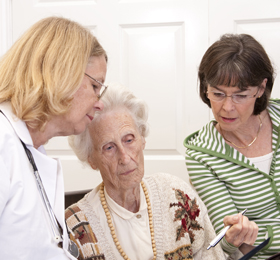Editor’s note: This week, we offer an Encore Presentation about a 2015 Sherman Award finalist. Our panel of judges has been spending time digging into this year’s cadre of nominations and will be meeting soon to select the 2017 winner. We take this moment to thank all of you who are doing work focused on building patient and family engagement and to thank those of you who submitted nominations for our judges to consider. Although there still is work to be done, the level of response and quality of the programs nominated demonstrate that patient engagement is growing and becoming an increasingly important force in healthcare. Stay tuned to EngagingPatients.org for news about the 2017 award, which will be announced and presented at the National Patient Safety Foundation conference in May.
During office visits, a physician’s first objective often is to assess their patients’ concerns and determine a course of action. What are their symptoms? What may be causing those symptoms? What tests should be ordered, if any? What’s the most effective treatment?
The Patient-Doctor Equation
But those questions are only part of the patient-doctor equation. Doctors might consider asking themselves a few other questions: How do I make patients feel important? How can I build a relationship and trust with this person? What words would help me learn more about what’s important to them?
These effective communication strategies not only help to deliver safe, high-quality medical care that matters the most to our patients, but also develops meaningful relationships that impact both parties.
Research has shown that effective patient-clinician communication:
- Improves patient satisfaction
- Reduces medical errors and malpractice suits
- Improves health outcomes
- Improves treatment adherence/compliance
- Decreases patient emotional stress
- Improves physician satisfaction
Putting the Focus on Relationships
Considering the competing challenges of limited time for patient interaction, variable expectations, and increasing medical complexity, it may seem difficult for clinicians to commit to increased communication. However, communication is the most common medical procedure most of us will ever perform. Rather than patient-centered language, we focused on relationship-centered language to honor the value of both the clinicians and patients.
When clinicians, or caregivers as we call them, are offered the resources to develop relationship-centered communication skills, they can improve their listening skills, empathy, teaching, time management and conflict resolution. They become more comfortable in even the most challenging communication situations, enhancing the experience of not only the patient, but also their loved ones.
A Foundation for Effective Communication
At Cleveland Clinic, we have developed the R.E.D.E. (Relationship: Establishment, Development and Engagement) Model. Like any skill, effective communication can be learned through practice and peer feedback. “R.E.D.E to Communicate: Foundations of Healthcare Communication” is the foundational course of our program. It teaches commonly effective tools and our model of communication and gives participants a safe environment in which to practice.
The course is a peer-led, CME-accredited course with most of the time spent practicing specific skills and working through challenging communication scenarios that the clinicians have encountered.
Positive, Powerful, Expansive
The feedback has been overwhelmingly positive and powerful. As a result, the course has evolved into a comprehensive Center for Excellence in Healthcare Communication, which includes advanced courses, a train-the-trainer program for incoming facilitators, peer communication skills coaching and research. This curriculum includes courses such as Delivering Bad News, Managing Difficult Communication Scenarios, Health Behavior Change, and Discussions of Code Status.
We have recruited and trained 42 physician facilitators from over 25 different specialties, including surgeons. We have recruited and trained 16 advanced clinical care provider facilitators from many different focus areas, which includes physician assistants, nurse practitioners, nurse managers, social workers and others with significant patient care contact.
System-wide Commitment
In 2013, our executive leadership team completed the communication skills training. Our CEO, Toby Cosgrove, M.D., requested that all staff physicians and house staff complete the course by April 2014. To date, we have had over 2,000 staff physicians, more than 800 clinical trainees, and over 500 advanced clinical care providers completed the course. The course is now part of our on-boarding training for staff and trainees.
A Boost to Self-Efficacy
What’s unique about this program is the research and data that back it up. For 2,000 attending physicians, we demonstrated statistically significant improvements in self-efficacy, burnout on the Maslach Burnout Inventory, empathy on Jefferson Scale of Empathy, and patient satisfaction. The course was developed by practicing clinicians for practicing clinicians, to help them face the real challenges in day-to-day practice. Lastly, we used multiple innovative methods to engage clinicians from the very moment they enter the room.
The Right Approach for Patients
Simply put, ensuring effective clinician-patient communication is the right thing to do for our patients. It is critical to the delivery of safe, high-quality medical care. In a healthcare environment full of initiatives and priorities, creatively designed communication skills training for experienced clinicians allows them to build more effective relationships with their patients and also each other…an opportunity to create the very meaning we are all looking for.





